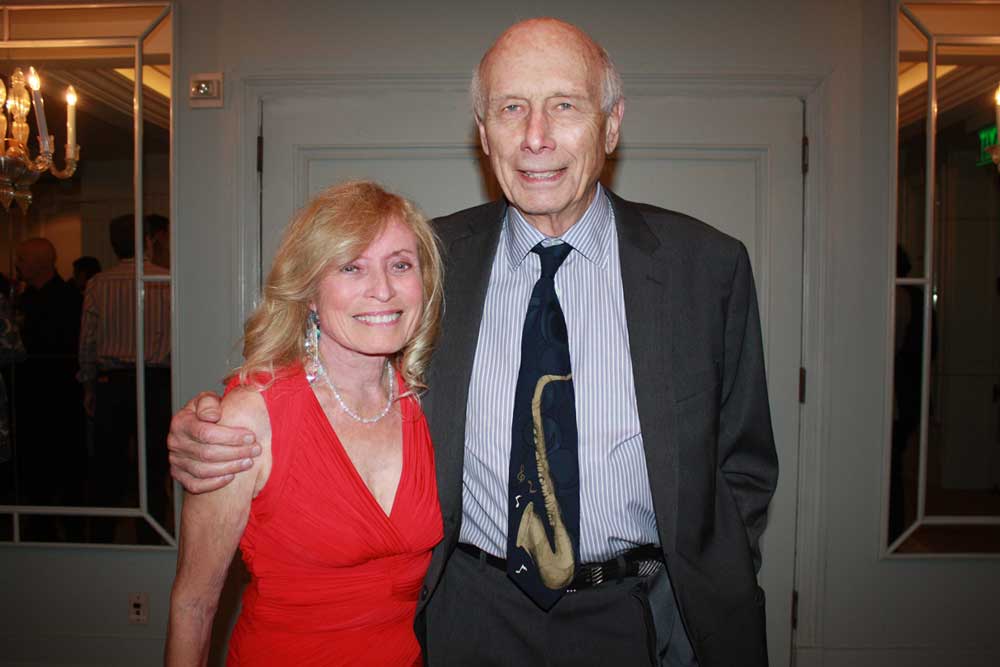
Jay Cooper and wife Darice. (Photo: Paula Parisi / MaxTheTrax)
The music industry has enjoyed a revenue surge, but artists are making half what they did in 2000, attorney Jay Cooper pointed out in the “best of times, worst of times” opener to his SESAC Visionary Award acceptance speech.
Cooper — who helped found Greenberg Traurig’s West Coast entertainment practice and has an enviable portfolio of clients that include Katy Perry, Jerry Seinfeld and Sheryl Crow — took up the “value gap” complaint, leveled at Silicon Valley, for raking in billions on the backs of creators whose content makes their techno gadgets desirable, but sharing only the table scraps of that wealth.
Surrounded by family and an audience of more than 200 friends and admirers as he took to the stage at SESAC’s annual awards gala May 31 at the Casa del Mar Hotel in Santa Monica, Cooper rattled his saber in the direction of San Jose. “We’re at a major crossroads in our industry right now,” he warned. “We love the tech companies, and we love technology, which has extended the reach of music beyond what we ever could have envisioned, to billions of people, giving creators access to audiences around the world.” Despite that, U.S. recording revenue is today, at $7.7 billion, only half what it was in 1999, when the industry peaked at $14.6 billion (according to RIAA figures) prompting Cooper to lament “something is wrong.”
He urged the music industry and the digerati to “work together to find a way to compensate fairly.” Those wise words, the result of six decades practicing law and playing saxophone, would be well-heeded. With a “we’re not gonna take it” attitude, the record sector has launched a fusillade of lawsuits and regulatory initiatives in the past few years. As someone who received a karate black belt at age 64, Cooper — whose firm represents the Recording Academy, of which he is a past president — is clearly not the guy the techs want shaking a sword in their direction.
That isn’t the only threat to the health of the music economy. “Musicians are suffering today,” the six-year veteran of the Los Angeles Philharmonic exhorted. “When I first came to town right out of school, with a band, to work in California every studio had full-sized symphony orchestras, each of the networks had full-sized symphony orchestras. There were clubs, there were ballrooms, people were working all the time. Now work that should stay right here in the community is fleeing to Seattle, Canada, Europe.” And not due to lack of local talent. While that is all gone and “not going to come back,” Cooper the visionary still sees the glass half-full with technology’s upside potential, if the details can be worked out.
Cooper took the stage surrounded by family and an audience of more than 200 admirers who welcomed him with a standing ovation. Introduced by his son Keith, an attorney, who said his father taught him to “always return phone calls” and “always be humble, because you never know if you’ll need a job someday from the person that’s working for you.” His top negotiating tip: in victory, “always leave the other side with their dignity, otherwise they’ll want revenge.” Cooper was extolled as an inspiration who still plays music regularly with the Big Band of Barristers and plays tennis every week to stay in shape.
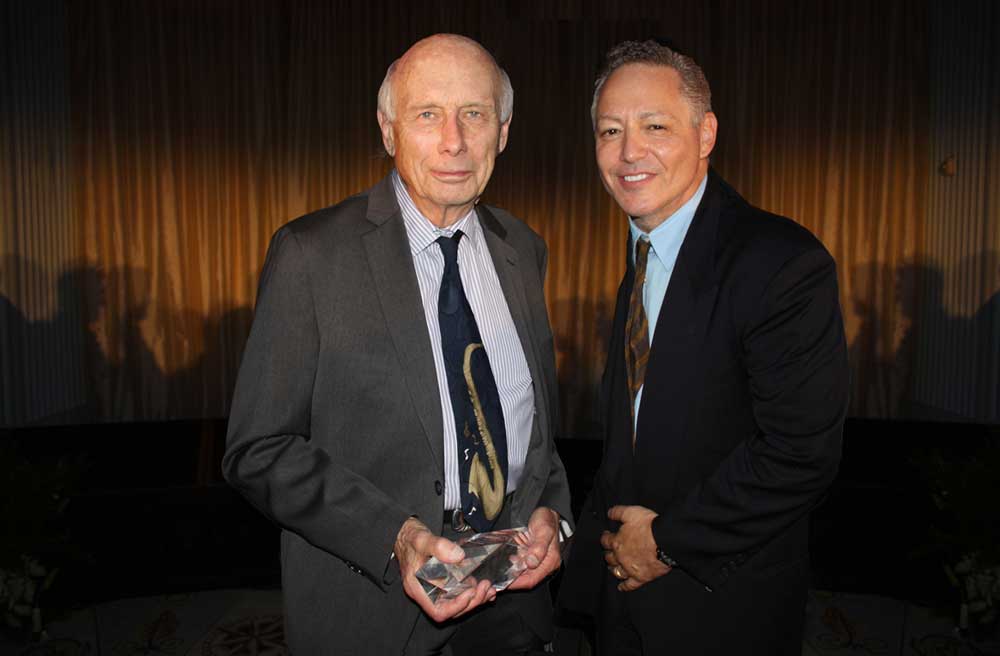
Jay Cooper, left, recipient of the 2017 SESAC Visionary Award, and Dodd Darin, son of Cooper’s former client singer and composer Bobby Darin. (Photo by Paula Parisi / MaxTheTrax)
He accepted his crystal trophy from composer, trumpeter and pianist Arturo Sandoval, a 10-time Grammy winner, client and friend who said that in his professional life, there isn’t a category the soft spoken Cooper has failed to dominate, representing legends such as Frank Sinatra, Nat King Cole and Bobby Darin (whose son, actor Dodd Darin, was on hand to celebrate the honor).
Cooper also mentioned as areas in need of legal and regulatory attention:
- The safe harbor provisions of the copyright act: “Safe harbor provisions were adopted in the copyright act in ’95 or ’98, long before what was going on today. The safe harbor provisions basically say that if you’re a carrier, like a telephone company, and illegal content is flowing along your lines, you’re not responsible for it unless you know about it, or you’re notified about it. ” Now that carriers are also content producers, and distributing work all over the world, he said that should change. “We need to have some sort of control of that so illegal content can be taken down. It is really hurting our industry in the multi-billions of dollars at this point.”
- Fractional licensing: “The DOJ has decided on its own account to say to the recording rights societies, you can’t just license your old share, you have to license the entire copyright even though you don’t represent the entire copyright. This is a major issue for artists and composers and has to be solved somehow.”
- Consent decrees: “It’s time to revisit Alden-Rochelle vs. ASCAP,” he said, referring to the 1948 anti-trust case on which numerous revisions to the 1941 consent decree rest. “Back then, they courts basically told ASCAP, you represent 90% of all the compositions that go into the theaters, so you can’t enforce performance rights because the theater owners have no choice. At the time, ASCAP had exclusive contracts from their composers and publishers.” Times have changed, and the law has not kept up.
There were lighthearted moments, as when the attorney shared that some nuances of transactional law escape even his keen intellect. “I was having this discussion with an English lawyer, in a contract for a film James Horner was doing, and there was a provision that the other guy really fought about taking out: ‘references to these conditions of engagement, to any condition, are for conditions of these conditions of engagement…’ It’s framed on my wall,” he said to explosive laughter.
He also shared some creative problem solving skills. “There is a saying, ‘Where there’s a hit, there’s a writ,'” he said, using the term of art for a legal document. “Lionel Richie, at one point we had four or five different claims on the song ‘Hello.’ I said, ‘Lionel we have to deal with these claims,’ and Lionel said to me, ‘Can’t we have them all sue each other and then the winner gets to sue me?’ Great solution! I said, it might not work that way. But we did solve the problem.” Richie prevailed.
He got client Keith Jarrett a co-writing credit on the Steely Dan song “Gaucho” with a phone call — one that happened to mention the band all but confessed to copying the song in an interview in Musician magazine.
He closed with his favorite favorite story: “My assistant Rose said ‘I have someone weird on the phone, do you want to talk to him?’ And I said, ‘Sure, put him on.’ And this guy says, ‘You represent Lionel Richie, and he wrote a song called “Wandering Stranger”…’ And I said, ‘Yes, why?’ And he said ‘I’m that stranger!'”
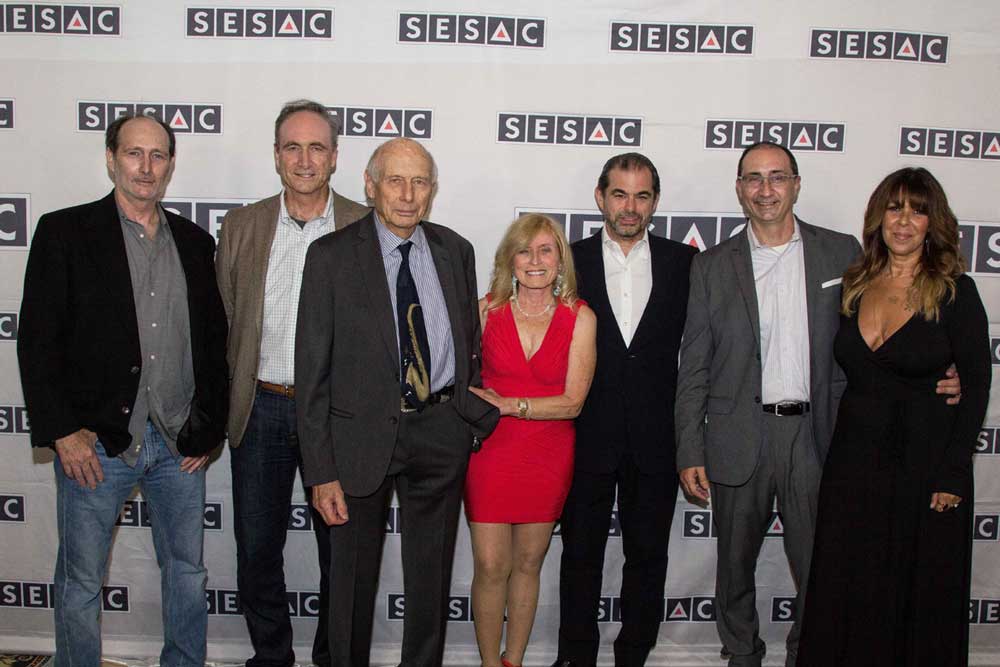
Jay Cooper (third from left) is joined by (from left) sons Les Cooper and Todd Cooper; wife Darice Cooper; SESAC CEO John Josephson; son Keith Cooper and wife Allison Burns Cooper. (Photo: Teal Moss / SESAC)
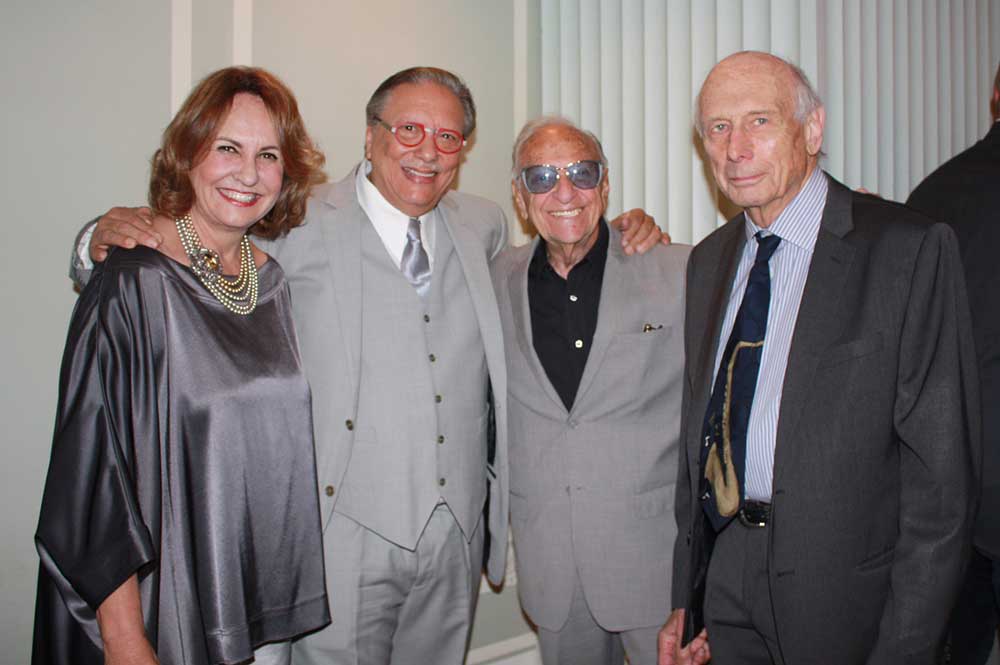
Marianela Sandoval, trumpeter and composer Arturo Sandoval, publicist Gene Schwam of Hansen & Schwam, and Greenberg Traurig’s Jay Cooper. (Photo by Paula Parisi / MaxTheTrax)
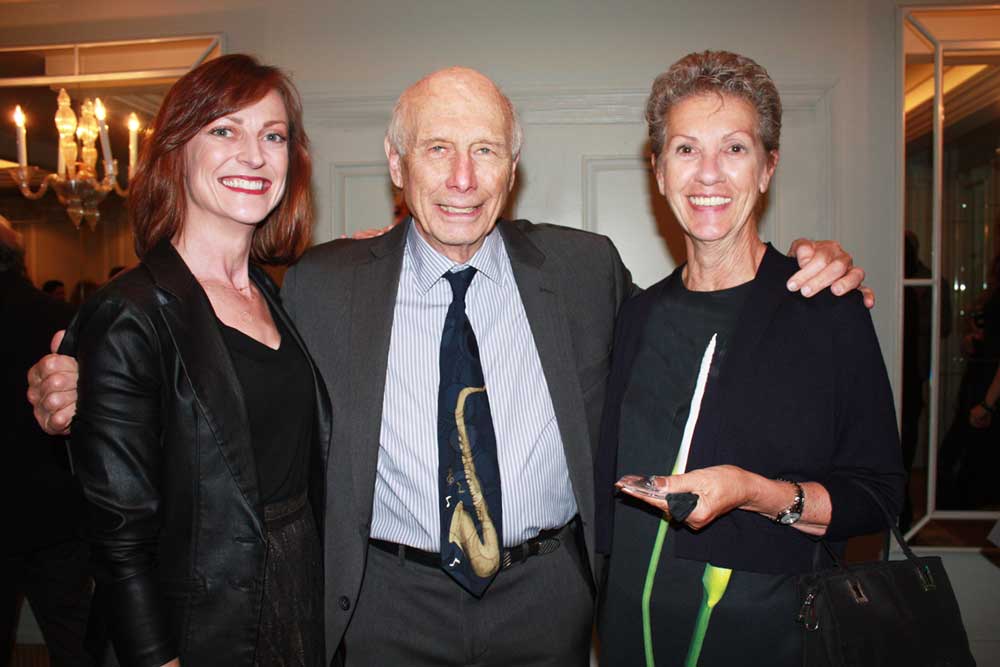
Team Cooper: SESAC Visionary Jay Cooper is flanked by his current executive assistant, Rebecca Herrick (left) and his right hand of 30 years, Rose Scaraglino. (Photo by Paula Parisi / MaxTheTrax)


Comments are closed.